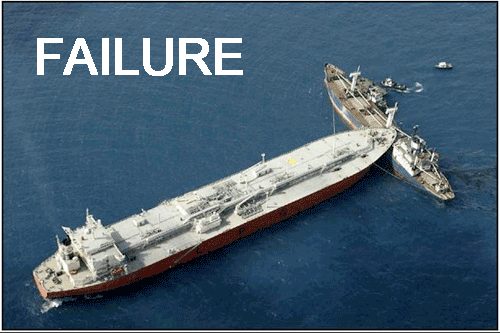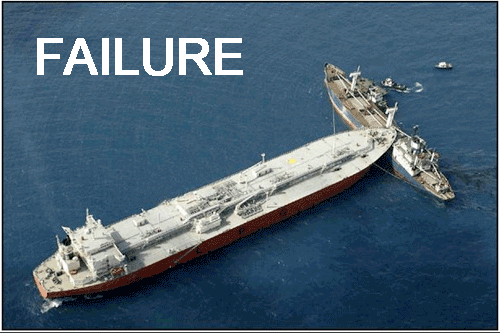Demolition Work Begins On The Francis Scott Key Bridge
by John Konrad (gCaptain) The Unified Command started clearing debris from the Francis Scott Key Bridge collapse today. They did not specify when they will resume the salvage operation for...




This post was first featured in the fall edition of the Council Of American Master Mariner’s official publication Sidlights. You can find the article on page 18 of the PDF found HERE.
“The only man who never makes mistakes is the man who never does anything.” Theodore Roosevelt
The maritime world is full of strict rules that may only be broken “in extremis”. The best known of these rules are “Never Turn Left”, “The Rule of Gross Tonnage” and my personal favorite “When In Doubt, Call the captain”.
Like a brimstone preacher we put the fear of god into heads of young cadets with the telling of these rules and back them up with sea stories of near misses and failure. The cherry on this sundae is often the saying “Take heed young man, these rules were written in the blood of past mariners.”
I contend these rules are doing more harm than good. Here are three modern examples that lead me to this conclusion:
ONE
Sailing on foreign flagged vessel I was amazed by one thing above all others, the sea stories. Having coffee for the first time with a group of Indian officers and discussing shipboard safety initiatives I soon discovered my sea stories, a collection of half truths I’ve deliberately embellished over the years, were passe. To further compliment personal confusion, my lack of experience in a major incident (e.g. hard collision, multiple-week grounding or engulfed fire, all experienced by at least one of my fellow crew mates) put into question the value of my input. “Wait a second, I protested, I have never experienced a major incident because I am a good mariner. My safety record alone should increase the value of my input.” After a long silence one of the Indian mates said, “John, we do not question your knowledge or ability just your experience. It is not your fault you had the resources available to prevent incidents and mentors able to guide you from trouble. We were not as lucky then but have experience now.”
What is evident here is a Catch 22. We can not suggest that young cadets experience the dregs of management aboard rusting freighters in the hope of gaining experience through failure.
TWO
In his bestselling book “The Four Hour Workweek”, Tim Ferris tells us that experts are simply the people who have accumulated the highest number of failures in a specific niche. It would therefore make sense to encourage failure among our industries best captains to evolve their expertise. A solid theory in principal. The problem with this thinking, however, is that the failure of a captain, especially one in command of a supertanker or LNG carrier, can lead to disaster in the magnitude of environmental catastrophe or loss of life.
THREE
In his book “Tankers Full Of Trouble”, Eric Nalder tells us that it’s not the young Captains who are most likely to face an incident. Rather it’s the experienced Captain, bored after years of taking the same route over and over, that often tries something new that leads to disaster.
The History
“I never saw a wreck and never have been wrecked, nor was I ever in any predicament that threatened to end in disaster.” Captain Edward Smith
If modern examples are not enough to convince you History is littered with lessons on the importance of failure. The Handbook Of Damage Control is considered the single best manual for preventing the loss of damaged ships. My question is… would the lessons contained in its pages have been learned without hundreds of hulls being lost under the authors’ watch? Would SOLAS regulations, which have saved countless lives, have been written without the tragedy of the Titanic and what about the morality rate on the day of her sinking? Would it have been so high if Captain Smith had prior experience in emergency response?
The Solution
“I have not failed. I’ve just found 10,000 ways that won’t work.” -Thomas Edison
At sea the importance of experiencing failure is second only to avoiding failure in the first place. We can have no desire or even tolerance for disaster at sea regardless of the importance of lessons learned from there occurance, so what is the solution? I offer four:
ONE
“When I interview a Master my first question is ‘Have you ever grounded a ship?’. If the candidate answers no he is either a liar or lacks experience, either way he’s unfit to command my vessels” -Anonymous Ship Owner.
Failure is critical to the learning process and should be encouraged in the resumes of candidates for master. The question of past failure needs to be asked in every senior level interview and should be a mandatory section of a candidate’s resume. It is not critical that past failures lead to a severe loss or that they even occurred at sea. It is important, however, that the candidate’s actions are analyzed and they have a robust understanding of the lessons learned.
TWO
“If you bungle raising your children, I don’t think whatever else you do well matters very much.” -Jacqueline Kennedy Onassis
As senior officers aboard ship it’s critically important that we allow the bridge team the opportunity to make mistakes so they can learn from their failure. During my first cargo discharge aboard a product tanker it took me 45 minutes to strip one tank. I did not learn for many years that my repeated failure to empty and switch tanks (without loosing suction or flooding the pump) caused a fight in the mess. The captain and chief mate were arguing about what should be done with the former saying “It’s an art he needs to learn through failure” and the later saying “We’d all save time and effort if I go teach him”.
Small failures can lead to big results. In this specific case I learned in 45 minutes what it takes some tankermen years to master, transferring from an empty to full tank, but I also learned other lessons like the management of a frustrated deck crew and remaining calm under stress. It is also important to note the conditions in which this lesson was learned. Sure there was great potential for environmental catastrophe or even flooding of the pump room but the lessons was taught in a controlled and monitored environment. In addition to closely monitoring me through the mess room porthole both the pumpman and engine room had been (quietly) put on notice, the weather was clam and daylight strong.
THREE
“Everybody’s a mad scientist, and life is their lab. We’re all trying to experiment to find a way to live, to solve problems, to fend off madness and chaos.” -David Cronenberg
The captain who creates a tanker full or trouble is the same man who played with chemistry sets as a child. He may no longer have the desire to create an explosion but his desire to experiment has not been quelled. Without the trial and testing of theories man has little room to grow and while a boring watch is certainly a safe one it serves no purpose beyond the short term goal of moving cargo from point A to B. It certainly does not prepare the vessel for the unforeseen circumstances of subsequent voyages.
There is a critical difference between experiments and unforeseen incidents. Both have the potential for catastrophic results but one can be accomplished with preparation, planning and under controlled circumstances. One can be dome with well rested personnel and cancelled at the first sign of bad weather or postponed after the failure of critical equipment. The other can not.
For example, advanced shiphandling techniques, like the use of anchors in maneuvering, are taught in simulator training along with guidance from the instructor to use these techniques when emergencies leave you with no other options but is an emergency really the time you want to try a new tactic on your equipment and crew? Would it not be safer to test these practices under ideal circumstances with a powerful tug alongside and ready to correct your mistakes?
My suggestion is to experiment under controlled circumstances.
FOUR
“Courage is not simply one of the virtues, but the form of every virtue at the testing point.” -C. S. Lewis
Are you an expert in the management of major emergencies? Have you ever heard the sound of the hull cracking under your feet as the chief mate calls the bridge with last words for his family? I have. No, I did not experience this tragedy at sea but in the safety of a major emergency lab. Simulators may not be as effective as your own vessel in testing skills like shiphandling or emergency response but when done with an eye for realism and expectation for failure they serve a critical purpose.
Currently the maritime world utilizes simulators for shiphandling, dynamic positioning, cargo ops and bridge team management but have we seen the extent of their ability to let us fail safely? The offshore industry has embrace the management of major emergencies with the simulation of tragic events but this technique has yet to be adopted by the wider maritime community. What other opportunities for training area we missing out on?
Final Words
For many years the maritime community has been searching for new ways to prevent and control the occurrence of incidents at sea but the level of loss remains at unacceptable levels. The master of a vessel is suppose to be the voice of sound reasoning that refuses to take any and all unnecessary risk but in doing so fails to train himself and those he commands in the lesson of failure. If we are going to take the next step towards a goal of zero loss then we need to accept the reality of danger at sea and promote the lessons of failure. If we can do so with proper management of circumstances and experimentation the results will lead to improved safety. If we can foster an acceptance of failure and promote individuals that have experienced its lessons, both ashore and at sea, the results will be powerful and lives will be saved.
Join the gCaptain Club for curated content, insider opinions, and vibrant community discussions.


Join the 105,793 members that receive our newsletter.
Have a news tip? Let us know.
Access exclusive insights, engage in vibrant discussions, and gain perspectives from our CEO.
Sign Up




Maritime and offshore news trusted by our 105,793 members delivered daily straight to your inbox.



Essential news coupled with the finest maritime content sourced from across the globe.
Sign Up